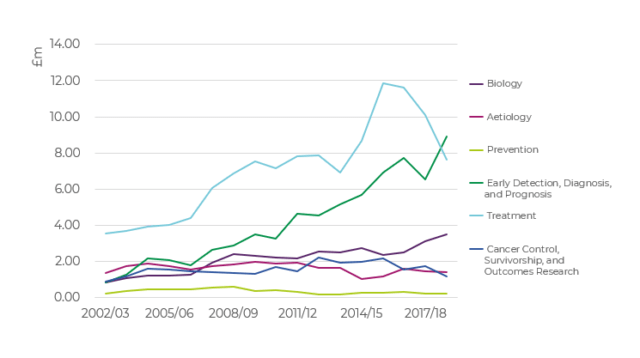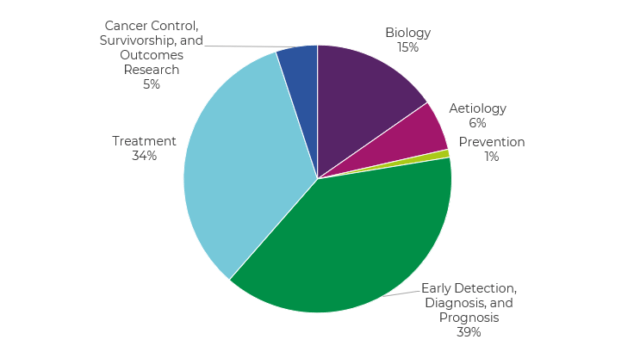Prostate Cancer Research recognised that with a large number of cancer research charities duplication was a possibility and that challenges that were obvious to them might be being tackled by someone else. They used several research methods, including data from the NCRI Cancer Research Database (CaRD), to produce a report on the prostate cancer research ecosystem and inform their strategy.
NCRI has been collecting cancer research funding data since 2002. NCRI Partners can benefit from using this data to understand how money is distributed across research areas and identifying research gaps.
To ensure the funding they provide is used effectively and in areas of research addressing the greatest need, Prostate Cancer Research evaluated not only their spend but all prostate cancer research funding. By mapping, analysing and assessing the prostate cancer research environment, they are ensuring their understanding of the areas of greatest need is up-to-date, and are in a stronger position to avoid duplication. The knowledge allows them to fill funding and research gaps and identify where they could collaborate and partner with other organisations to really make a difference for people affected by prostate cancer.
Due to the impact of the Covid-19 pandemic on cancer research charities, which predict their spend on research could drop by 46%, equating to £167m, next year, it is more vital than ever that we invest our more limited funds in the most impactful way.
Dr Naomi Elster, Head of Research and Communications, Prostate Cancer Research
To understand the current research priorities, Prostate Cancer Research undertook literature reviews, an audit of UK university research, and interviewed researchers and patients. Their mapping of the research ecosystem included identifying available funding sources and using the NCRI Cancer Research Database to analyse projects funded by NCRI partners and gain an overview of the wider funding landscape.
According to data held in the NCRI Cancer Research Database, most funding in prostate cancer goes toward research related to early detection and diagnosis (39%), followed by treatment (34%), with prevention receiving the lowest amount of funding (1%). Over time, early detection and treatment have seen the sharpest increases in research funding.
Trends in prostate cancer spend over time

Prostate cancer spend 2018/19

The main findings of the report were:
- Researchers at all career stages struggle to get funding for innovative ideas
- Significant gaps exist in the scientific knowledge of prostate cancer, including:
- Predicting a prostate tumour’s likely aggressiveness and therapy response
- Why and how prostate cancer spreads to the bone
- Understanding the broader role and mechanism of androgen receptor variants in prostate cancer and androgen therapy resistance
- Most funding, and most clinical trials, are heavily concentrated within the ‘Golden Triangle’ of London-Oxford-Cambridge
- Early career researchers face significant challenges in getting funding, establishing their careers, transitioning to the next stage, and establishing collaborations and networks
What Prostate Cancer Research is doing to improve its impact
- Funding high-risk proposals for an initial 18 months and changing their strategy and culture towards greater acceptance of failure, a high risk for high reward mentality
- Using their analysis of knowledge gaps to inform future grant calls to fill these gaps in the prostate cancer research landscape
- Looking to develop partnerships with other organisations where prostate cancer shares a knowledge gap or unmet need with another disease
- Ensuring there is equitable distribution of grants to ensure there is equal opportunity for all scientists to receive funding whatever their location
- Promoting the careers of young scientists, welcome proposals with young scientists as leads or co-leads, and ensuring pilot awards cover salary and consumables of an early career researcher to support their careers
We want to thank the NCRI, particularly Alexander Renziehausen and Abdul Mutabbir, for their assistance with the CaRD data which significantly strengthened our report. Having built an evidence-base for some of the challenges that affect both prostate and other cancers, we are even more committed to working in partnership with others to solve these challenges and create a more robust pipeline between excellent science and patient benefit, and to support the careers of the scientists on whom research progress depends.
Dr Naomi Elster, Head of Research and Communications, Prostate Cancer Research
Several of the issues identified by Prostate Cancer Research in their report are likely to impact other areas of cancer research, including limited funding caused by the COVID-19 pandemic, the opportunities for collaboration between organisations and the importance of supporting early-career researchers.
There is a need compounded by the COVID-19 pandemic to increase partnership working and our collective impact as a research community. As a partnership of key players in cancer research in the UK, the NCRI can bring partners together to address identified areas of need that affect many cancer types.
NCRI has also identified the need to address the critical academic attrition points during the clinical training and career pathway to ensure research remains a driver of better healthcare. The NCRI Early Career Researcher Programme is our crucial initiative to involve early career researchers in everything we do, bringing them together as a community and supporting them to realise their aspiration of contributing to the progress of cancer research.